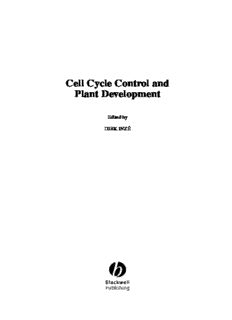
Cell Cycle Control and Plant Development (Annual Plant Reviews, Volume 32) PDF
Preview Cell Cycle Control and Plant Development (Annual Plant Reviews, Volume 32)
Cell Cycle Control and Plant Development Editedby DIRKINZE´ Cell Cycle Control and Plant Development Cell Cycle Control and Plant Development Editedby DIRKINZE´ (cid:1)C 2007byBlackwellPublishingLtd BlackwellPublishingeditorialoffices: BlackwellPublishingLtd,9600GarsingtonRoad,OxfordOX42DQ,UK Tel:+44(0)1865776868 BlackwellPublishingProfessional,2121StateAvenue,Ames,Iowa50014-8300,USA Tel:+15152920140 BlackwellPublishingAsiaPtyLtd,550SwanstonStreet,Carlton,Victoria3053,Australia Tel:+61(0)383591011 The right of the Author to be identified as the Author of this Work has been asserted in accordancewiththeCopyright,DesignsandPatentsAct1988. Allrightsreserved.Nopartofthispublicationmaybereproduced,storedinaretrievalsystem, ortransmitted,inanyformorbyanymeans,electronic,mechanical,photocopying,recording orotherwise,exceptaspermittedbytheUKCopyright,DesignsandPatentsAct1988,without thepriorpermissionofthepublisher. Firstpublished2007byBlackwellPublishingLtd ISBN:978-1-4051-5043-9 LibraryofCongressCataloging-in-PublicationData Cellcyclecontrolandplantdevelopment/editedbyDirkInze´. p. cm. ISBN-13:978-1-4051-5043-9(alk.paper) ISBN-10:1-4051-5043-2(alk.paper) 1.Plantcellcycle. 2.Cyclin-dependentkinases. 3.Plantcellsand tisues–Growth–Regulation. I.Inze´,D.(Dirk) QK725.C3742007 571.8(cid:2)4929—dc22 AcataloguerecordforthistitleisavailablefromtheBritishLibrary Setin10/12ptTimes byAptaraInc.,NewDelhi,India PrintedandboundinSingapore byCOSPrintersPteLtd Thepublisher’spolicyistousepermanentpaperfrommillsthatoperateasustainableforestry policy,andwhichhasbeenmanufacturedfrompulpprocessedusingacid-freeandelementary chlorine-freepractices.Furthermore,thepublisherensuresthatthetextpaperandcoverboard usedhavemetacceptableenvironmentalaccreditationstandards. ForfurtherinformationonBlackwellPublishing,visitourwebsite: www.blackwellpublishing.com Contents Contributors xiii Preface xvii 1 Thegrowingfamilyofplantcyclin-dependentkinaseswith multiplefunctionsincellularanddevelopmentalregulation 1 DE´NESDUDITS,MA´TYA´SCSERHA´TI,PA´LMISKOLCZI ANDGA´BORV.HORVA´TH 1.1 Introduction 1 1.2 StructuraldiversityinthefamilyofplantCDKs 2 1.3 ExpressionprofilesofCDKgenes:structuresandfunctions ofpromoters 14 1.4 DiversefunctionsofCDKproteincomplexesinmultiple regulatorymechanisms 20 1.5 DevelopmentalconsequencesofalteredCDKfunctions 24 1.6 Perspectives 25 Acknowledgments 25 References 26 2 Theplantcyclins 31 JEROENNIEUWLAND,MARGITMENGESAND JAMESA.H.MURRAY 2.1 Introduction 31 2.1.1 Cyclinsandthecellcycleoscillator 31 2.2 Theplantcyclinfamily 32 2.2.1 Phylogeneticrelationshipsbetweenanimal andplantcyclins 33 2.2.2 Cyclindomains 34 2.2.3 A-typecyclins 34 2.2.4 B-typecyclins 40 2.2.5 D-typecyclins 41 2.2.6 Othercyclins 42 2.3 Expressionofcyclinsduringthecellcycle 47 2.3.1 TheG1checkpoint 47 2.3.2 Sphase 48 2.3.3 G2–M 49 2.4 Cyclinsinplantdevelopment 49 2.5 Concludingremarks 53 vi CONTENTS Acknowledgments 54 References 54 3 CDKinhibitors 62 HONGWANG,YONGMINGZHOU,JUANANTONIO TORRESACOSTAANDLARRYC.FOWKE 3.1 Introduction 62 3.2 PlantCDKinhibitorsandsequenceuniqueness 64 3.3 Expression 66 3.4 InteractionswithcellcycleproteinsandCDKinhibition 68 3.5 Proteinstabilityandmodifications 71 3.6 Cellularlocalization 72 3.7 CDKinhibitorsandplantgrowthanddevelopment 74 3.8 Cellcyclephasetransitions 77 3.9 Cellcycleexitandendoreduplication 78 3.10 Concludingremarks 80 Notesaddedatproofingstage 82 Acknowledgments 82 References 82 4 TheUPS:anenginethatdrivesthecellcycle 87 PASCALGENSCHIKANDMARIECLAIRECRIQUI 4.1 Themolecularmachinerymediatingubiquitin-dependent proteolysis 87 4.1.1 Ubiquitylationreaction 87 4.1.2 Ubiquitinproteinligases 89 4.2 TheSCFandAPC/C:thetwomasterE3sregulating thecellcycle 89 4.2.1 TheSCF:anE3regulatingtheG1/Stransition 90 4.2.2 TheAPC/C:theE3coordinatingcellcycle progressionthroughmitosisandG1 90 4.3 Cellcycletargetsoftheproteolyticmachinery 92 4.3.1 ThetransitionfromG1toSphase 92 4.3.2 RegulatorsthatcontrolDNAreplicationlicensing 95 4.3.3 Metaphasetoanaphasetransition 98 4.3.4 Mitoticcyclindestruction:theessentialsteptoexit mitosis 99 4.3.5 APCCDC20versusAPCCDH1/CCS52 101 4.3.6 RegulationofendoreduplicationbytheAPC/C 103 4.4 Conclusion 104 References 104 5 CDKphosphorylation 114 AKIESHIMOTOHNOANDMASAAKIUMEDA 5.1 Introduction 114 5.2 OverviewofCAKsinyeastsandvertebrates 116 CONTENTS vii 5.3 Vertebrate-typeCAKinplants 117 5.3.1 CDKD,cyclinHandMAT1 117 5.3.2 CDKDproteincomplexes 119 5.3.3 CDKDincellcycleregulationandtranscriptional control 120 5.4 Plant-specificCAK 121 5.4.1 UniquefeaturesofCDKF 121 5.4.2 CAK-activatingkinaseactivityofCDKF 122 5.5 ManipulationofinvivoCDKactivitiesbyCAK 124 5.6 InhibitoryphosphorylationofyeastandvertebrateCDKs 125 5.7 InhibitoryphosphorylationofplantCDKs 126 5.7.1 PlantWEE1kinases 126 5.7.2 Requirementfortyrosinedephosphorylationinplant celldivision 127 5.7.3 ACDC25-likephosphataseandanantiphosphatasein Arabidopsis 129 5.8 Conclusionandperspectives 130 Acknowledgments 131 References 131 6 E2F–DPtranscriptionfactors 138 ELENARAMIREZ-PARRA,JUANCARLOSDELPOZO, BE´NE´DICTEDESVOYES,MAR´IADELAPAZSANCHEZ ANDCRISANTOGUTIERREZ 6.1 E2F–DPtranscriptionfactors:ahistoricalperspective 138 6.2 DomainorganizationofE2F–DPproteins 139 6.2.1 DNA-bindinganddimerizationdomains 139 6.2.2 RBR-bindingdomain 141 6.3 Transcriptionalandpost-translationalregulationofE2F 141 6.3.1 Transcription 141 6.3.2 Phosphorylation 143 6.3.3 Subcellularlocalization 143 6.3.4 SelectiveproteolysisofE2FandDP 143 6.4 E2F–DPtargetgenes 144 6.4.1 DNAreplicationgenes 148 6.4.2 Cellcyclegenes 151 6.4.3 E2Ftargetsindifferentiatedcells 152 6.4.4 Genome-wideapproachestoidentifyE2Ftarget genes 153 6.5 FunctionalrelevanceofE2F–DPindevelopment 154 6.6 E2Fandepigeneticregulationofgeneexpression 155 6.7 Concludingremarks:complexityofE2F-dependent regulationofgeneexpression 157 Acknowledgments 158 References 158 viii CONTENTS 7 Functionoftheretinoblastoma-relatedproteininplants 164 WILHELMGRUISSEM 7.1 Introduction 164 7.2 Retinoblastomaproteinsandthetumorsuppressorconcept 164 7.3 Theretinoblastomapathwayisconservedinanimalsand plants 165 7.4 RetinoblastomaproteinsformcomplexeswithE2F transcriptionfactorstocontrolentryintothecellcycle 166 7.5 G1restrictionpointcontrolismediatedbyretinoblastoma proteinphosphorylation 168 7.6 AnimalandplantDNAvirusestargetretinoblastomaproteins toinducehostDNAreplication 169 7.7 Informationonretinoblastomaproteinfunctioninanimal developmentisstillincomplete 169 7.8 Retinoblastomaproteinsmayhaveconservedfunctionsin germlinedevelopment 171 7.9 Retinoblastomaproteinsconnectstemcellmaintenanceto cellproliferationanddifferentiation 172 7.10 PerturbationofRBRduringleafdevelopmentaffectscell proliferationandcontrolofDNAreplication 174 7.11 Rolesofretinoblastomaproteinsintranscriptionactivation andrepression 175 7.12 Retinoblastomaproteinsinteractwithpolycombgroup complexesincontrollinggeneexpression 176 7.13 Conclusion 178 Acknowledgments 179 References 179 8 Auxinfuelsthecellcycleengineduringlateralrootinitiation 187 STEFFENVANNESTE,DIRKINZE´ ANDTOMBEECKMAN 8.1 Introduction 187 8.2 Cellcycleregulationduringlateralrootdevelopment 188 8.3 Stemnessofthexylempoleassociatedpericycle 189 8.4 Auxinsignallingduringlateralrootinitiation 190 8.5 Post-transcriptionalfeedbackmechanismsonauxinsignalling 193 8.6 Polarauxintransportdefineslateralrootboundaries 194 8.7 Cytokininsinhibitlateralrootdevelopment 195 8.8 Brassinosteroidsregulateauxintransport 196 8.9 Lightaltersauxinsensitivity 197 8.10 Conclusionsandperspectives 197 References 198 9 Cellcyclecontrolduringleafdevelopment 203 ANDREWJ.FLEMING 9.1 Introduction 203 9.2 Thecellcycleandcelldivisionduringleafinitiation 204
Description: